Herbalism
Your Step-by-Step Guide to Becoming a Herbalist
Nurturing a passion for botanical medicine, embark on a transformative journey to unlock the secrets of herbalism and unlock your full potential.
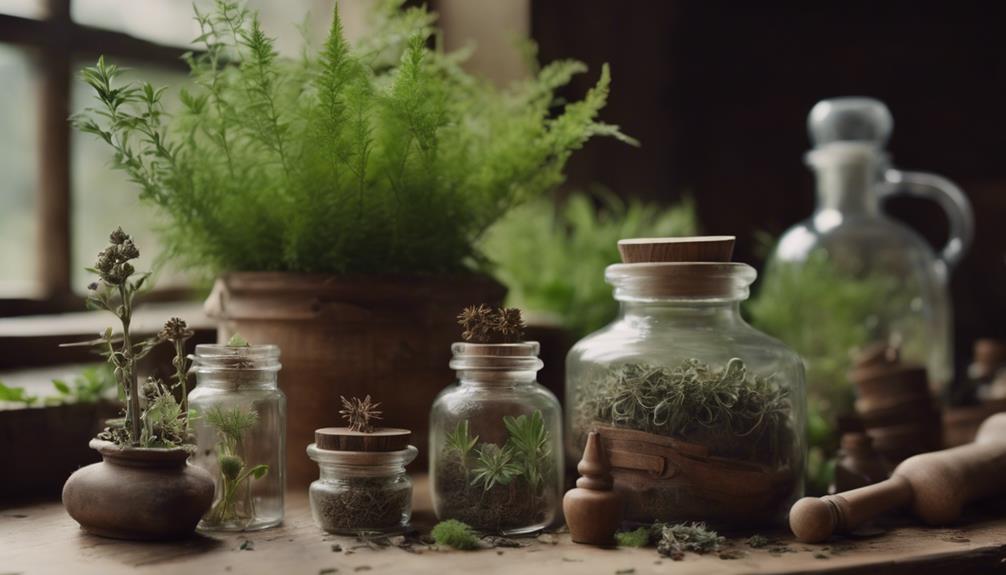
As we begin the journey to become a herbalist, we'll delve into the intricacies of plant properties, medicinal uses, and holistic approaches to preventive care and treatment. We'll explore herbal certification, establishing a strong foundation in herbalism fundamentals, and gaining practical experience through internships and workshops. We'll develop skills in creating herbal remedies, understanding relevant legislation, and sustainable gardening techniques. To succeed, we'll need dedication, hard work, and a commitment to ongoing education. By following these steps and continuing on this path, we'll unravel the secrets of botanical medicine and discover our potential as herbalists.
Key Takeaways
• Build a strong foundation in herbalism by learning fundamentals, including plant properties, medicinal uses, and herbal preparation methods.
• Gain practical experience through internships, apprenticeships, workshops, and volunteering in herbal businesses or community projects.
• Develop essential skills, including creating herbal remedies, business planning, case study analysis, and knowledge of plant properties and medicinal uses.
• Pursue advanced education and certification through reputable programs, such as the Registered Herbalist option offered by the American Herbalist Guild.
• Secure professional memberships, such as the American Herbalists Guild, and consider associate's or bachelor's degrees to further your herbalist career.
Understanding Herbal Certification
Exploring the world of herbalism, we often encounter the assumption that there's a clear, federally recognized path to certification in the US, but surprisingly, that's not the case.
In reality, there's no federally recognized, licensed path for herbal certification in the US. This lack of regulation can lead to confusion, and some schools offering certification upon graduation are often misleading. The Herbal Academy, for instance, provides certificates of completion, not certification.
So, what does it mean to be certified as a herbalist? The American Herbalist Guild offers a Registered Herbalist option, which provides recognition within the field. Herbal certification is more about recognition among peers and affirmation of ethical practice.
Understanding that becoming a herbalist requires dedication, hard work, and a commitment to ongoing education is crucial. We must navigate the complexities of herbal certification, separating fact from fiction, to truly understand what it means to be a certified herbalist.
Building a Strong Foundation

As we commence our journey to become herbalists, we recognize the importance of building a strong foundation in herbalism.
We'll focus on learning the fundamentals, developing essential skills, and constructing a solid knowledge base that encompasses herbal materia medica, plant identification, and ethical practices.
Herbalism Fundamentals Learned
We explore the world of herbalism by establishing a solid understanding of herbalism fundamentals, which serve as the building blocks of a successful herbalist. These fundamentals include learning about plant properties, medicinal uses, and herbal preparation techniques. We investigate the history of herbalism, understanding the cultural significance of medicinal plants and developing knowledge in botany, plant identification, and sustainable harvesting practices.
| Herbalism Fundamentals | Key Concepts | Applications |
|---|---|---|
| Plant Properties | Chemical composition, energetics | Understanding therapeutic benefits |
| Medicinal Uses | Herbal actions, holistic approach | Preventive care, disease treatment |
| Herbal Preparation | Infusions, decoctions, tinctures | Safe usage guidelines, dosing |
| Botany and Identification | Plant anatomy, classification | Sustainable harvesting, quality control |
| History and Culture | Traditional practices, cultural significance | Preservation of traditional knowledge |
Essential Skills Developed
Through rigorous training and hands-on experience, we develop a diverse set of skills that form the foundation of a successful herbalist practice. Our herbal education provides us with a deep understanding of plant properties and their medicinal uses, allowing us to create effective herbal remedies for various health conditions. We learn about the history of plants, relevant legislation, and organic gardening techniques to guarantee sustainable and ethical practices.
As we undergo herbalist training, we develop essential skills, including:
- Practical experience in creating herbal remedies, honing our ability to craft effective treatments for clients.
- Business planning skills, preparing us for entrepreneurship or consulting roles.
- Case study analysis, refining our critical thinking and problem-solving abilities.
These skills, combined with our knowledge of herbalism, enable us to provide high-quality services to clients and establish a reputable practice.
Additionally, obtaining herbalist certification enhances our credibility, opening doors to opportunities in teaching, counseling, and naturopathic medicine. By developing these essential skills, we build a strong foundation for a successful and fulfilling career as a herbalist.
Foundational Knowledge Built
Building a strong foundation as a herbalist begins with acquiring a deep understanding of herbal materia medica, which serves as the backbone of our practice. This foundational knowledge is crucial in developing our skills and expertise as herbalists. We need to understand the properties, actions, and uses of various herbs, as well as their contraindications and herb-drug interactions.
| Foundational Knowledge | Description |
|---|---|
| Herbal Materia Medica | Understanding the properties, actions, and uses of various herbs |
| Contraindications | Knowing when to avoid using certain herbs or combinations |
| Herb-Drug Interactions | Understanding potential interactions with medications |
Gaining Practical Experience

As we explore the world of herbalism, gaining practical experience is essential to becoming a skilled herbalist. We need to put our knowledge into action and learn from experienced professionals in the field.
Here are three ways to gain practical experience:
- Internships and Apprenticeships: Work under the guidance of experienced herbalists or herbal clinics to learn hands-on skills and gain insight into the daily operations of a herbal business.
- Herbal Businesses and Workshops: Participate in workshops, seminars, and conferences to expand our knowledge and skills in herbalism. We can also work in health food stores or herbal businesses to understand customer interactions and operations.
- Community Projects and Small Business: Volunteer in community herbal projects to gain hands-on experience and make connections in the herbalist community. We can also start a small herbal business to practice creating and selling herbal remedies.
Developing Herbal Skills
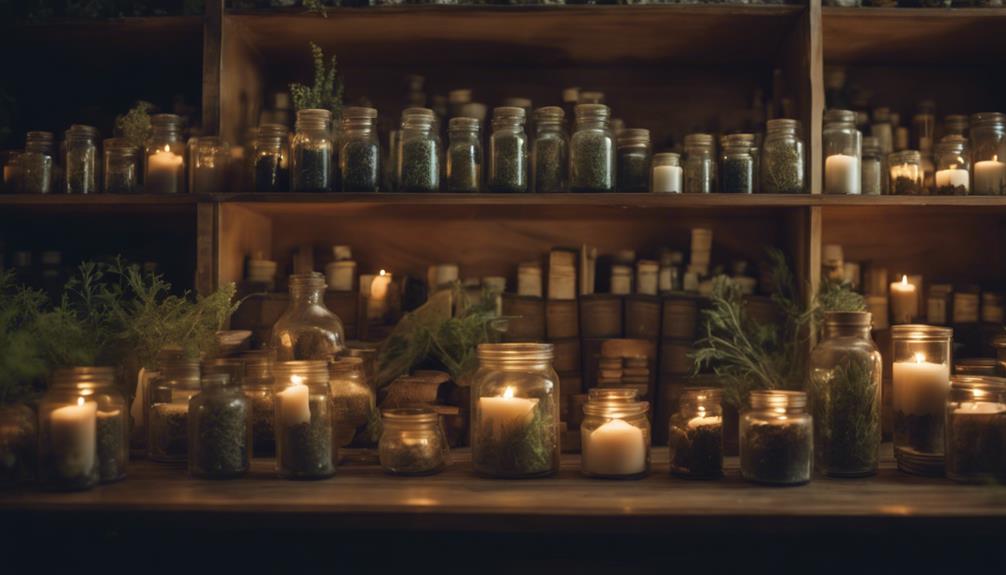
As we continue our journey to become herbalists, we're now focused on developing the skills that'll make us proficient in our craft.
We'll explore the fundamentals of herbal medicine, learning how to create effective remedies and practicing various therapies to address different health concerns.
From understanding the properties of medicinal plants to mastering the art of herbal remedies, we'll cover it all to become well-rounded herbalists.
Herbal Medicine Fundamentals
We enhance our herbal skills by exploring the fascinating world of plant properties, investigating the history of herbal medicine, understanding current legislation, and mastering organic gardening techniques. This foundation in herbal medicine fundamentals provides a solid base for our future practice as herbalists.
To further build our knowledge, we'll investigate the following key areas:
- Botanical Medicine: We'll study the properties and uses of medicinal plants, understanding how they interact with the body to promote healing and wellness.
- Natural Remedies: We'll learn about various natural remedies, from teas and tinctures to salves and infusions, and how to prepare and use them effectively.
- Herbal Medicine History: We'll explore the rich history of herbal medicine, tracing its development and evolution over time, and understanding its cultural significance.
Learning Herbal Remedies
By diving into the world of herbal remedies, we're now ready to develop hands-on skills in creating our own herbal preparations, from tinctures and teas to salves and infusions.
To do this, we'll study the properties and uses of medicinal plants, learning about their history, legislation, and organic gardening techniques. We'll acquire knowledge on plant identification, harvesting, and preparation methods to create effective herbal remedies.
Practicing the preparation of herbal tinctures, teas, salves, and other remedies will enhance our skills. Understanding the importance of ethical wildcrafting, sustainability, and quality control in herbal remedy preparation is vital.
We'll learn about responsible foraging and harvesting practices to promote the long-term survival of medicinal plants. By mastering these skills, we'll be able to create high-quality herbal remedies that are both safe and effective.
With dedication and practice, we'll become proficient in creating herbal remedies that can improve overall health and well-being.
Practicing Herbal Therapies
How do we explore our knowledge of herbal remedies into effective therapeutic practices that promote wellness and alleviate suffering? As we immerse ourselves in the world of practicing herbal therapies, we must develop hands-on skills in creating herbal remedies through practical experience and application. This involves understanding the properties of different plants for treating various illnesses and health conditions.
Here are three essential skills we need to master as practicing herbalists:
- Crafting herbal products: We must learn to create herbal remedies, such as tinctures, salves, and teas, using herbs that are safe and effective.
- Collaborating with herbal pharmacists: We need to understand how to work with herbal pharmacists to develop customized herbal formulas for our clients.
- Using herbs sustainably: We must acquire knowledge of plant history, legislation, and organic gardening techniques to guarantee sustainable herbal practices.
Creating a Business Plan

Creating a detailed business plan is essential to establishing a successful herbalism practice. It outlines our strategy for turning our passion into a profitable venture. As herbalists, we need to identify our target audience, the products and services we'll offer, and what sets us apart from others in the industry.
Our business plan should include a thorough marketing strategy, a competition analysis, and realistic financial projections. We'll also need to outline our sourcing process for high-quality herbs, our methods for creating herbal products, and our packaging strategies. Additionally, we'll develop a pricing strategy, distribution channels, and a plan for acquiring customers.
Pursuing Advanced Education
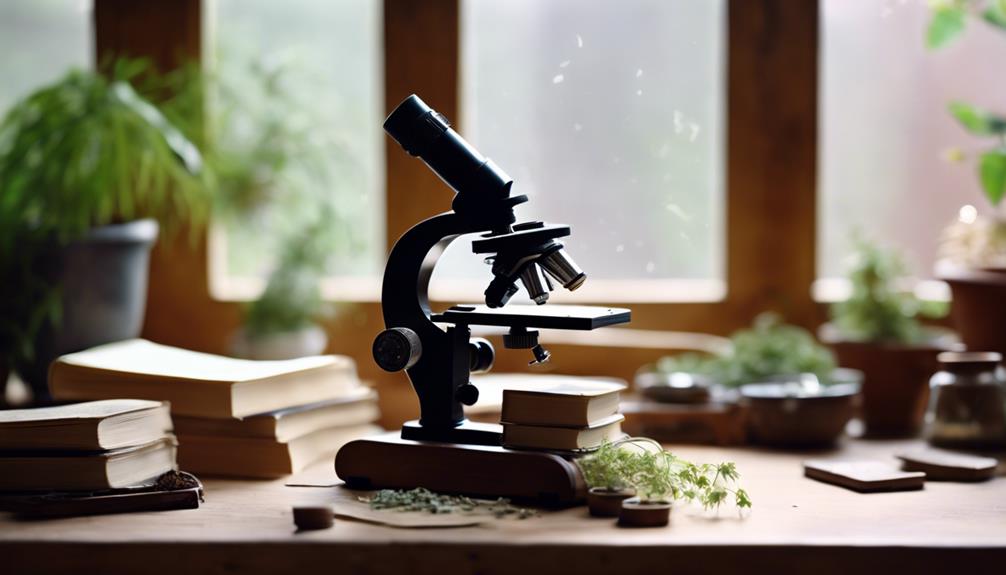
As we endeavor to elevate our herbalism practice, we recognize that pursuing advanced education is essential to staying current with the latest research, refining our skills, and expanding our knowledge in the field.
To achieve this, we can explore various avenues, including accredited universities offering degree programs in botanical medicine or herbal sciences. These programs cover a wide range of topics, from preventing disease with herbs to quality assurance in herbal product manufacturing.
To gain a deeper understanding of herbal medicine, we can consider the following options:
- Herbalist certification programs: These programs provide specialized training and in-depth knowledge in herbal medicine.
- Associate's and bachelor's degrees: These degrees offer a thorough education in botanical medicine and herbal sciences.
- Continuing education opportunities: These opportunities allow us to stay updated on the latest research and advancements in the field.
In addition to formal education, we can gain hands-on experience through internships with experienced herbalists, volunteering at herbal clinics, and working in health food stores.
Securing Professional Memberships

We take our herbalism practice to the next level by securing professional memberships that demonstrate our expertise and commitment to the field. Joining the American Herbalists Guild (AHG) is a significant milestone, as it recognizes our expertise in medicinal plant usage and herbal remedies.
To become a Registered Herbalist with AHG, we must complete 800 hours of herbal education and 400 hours of clinical experience. This involves taking courses in human sciences, nutrition, materia medica, pharmacy, and botany. AHG certification not only enhances our credibility but also aids in evaluating and dispensing herbal remedies.
As certified herbalists, we can explore opportunities in teaching, counseling, and naturopathic medicine. AHG membership is a badge of excellence, signaling our dedication to the field and our ability to provide high-quality herbal healthcare services.
Launching a Herbalist Career
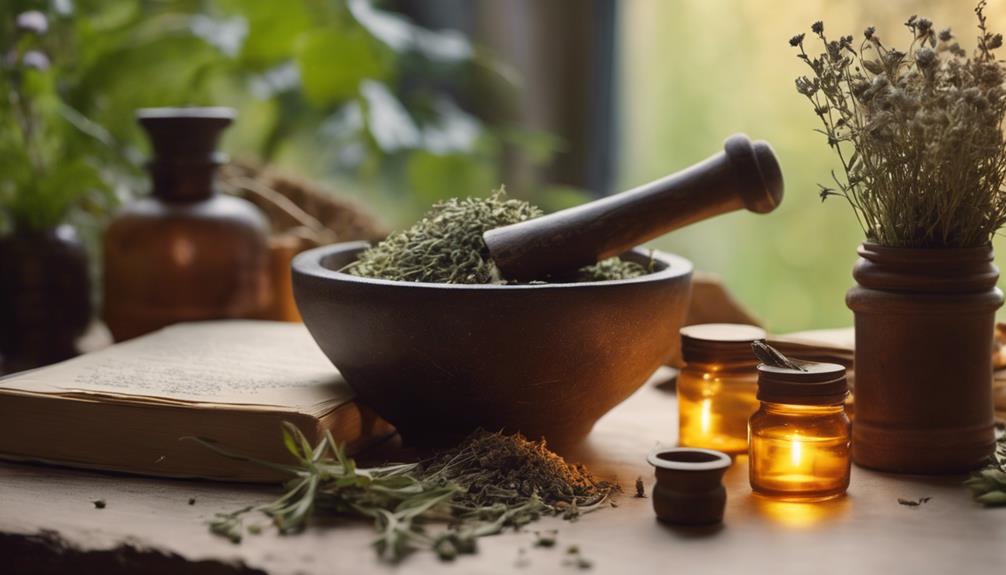
By deciding on a learning path that suits our goals and learning style, we can launch a fulfilling herbalist career that aligns with our passions and strengths. To become an herbalist, we need to explore various paths that cater to our individual needs.
Here are three essential steps to kickstart our herbalist career:
- Choose a learning method: We can opt for self-study, apprenticeships, or formal education programs, depending on our learning style and goals.
- Select a herbal tradition: We can focus on Western Herbalism, Traditional Chinese Medicine, or Ayurveda, among other traditions, to broaden our knowledge base.
- Enroll in a reputable program: We should research and select accredited schools or programs that offer courses in herbal medicine, botany, plant identification, and herbal preparations.
Frequently Asked Questions
What Are the First Steps to Becoming an Herbalist?
We're excited to start our herbalism journey! We'll research different paths, explore Western Herbalism and other traditions, and choose our learning method – self-study, apprenticeship, or formal education – to take our first steps towards becoming herbalists.
How Many Years Does It Take to Become a Herbalist?
"We thought becoming a herbalist would take a fixed amount of time, but surprisingly, it varies – from a few months to several years, depending on our goals, study pace, and chosen educational path."
How to Make a Career in Herbalism?
We build a career in herbalism by exploring diverse paths, from clinical practice to writing and education, and specializing in areas like community outreach or blending approaches for a holistic practice.
When Can I Call Myself an Herbalist?
We can call ourselves herbalists when we've finished a recognized education program or apprenticeship, and obtained certification from reputable organizations like the American Herbalist Guild, demonstrating our expertise and commitment to ethical practice.
Conclusion
As we reflect on our journey to becoming herbalists, we're reminded of the ancient Greek physician Hippocrates, who said, 'Everything in excess is opposed to nature.'
Like a well-balanced herbal remedy, our path has required a delicate blend of education, experience, and dedication.
With a strong foundation in herbal certification, practical experience, and continuous learning, we're now equipped to harness the healing power of plants and make a meaningful impact in our communities.
Herbalism
How to Get Proficiency With an Herbalism Kit in 10 Steps
Learn the ancient art of herbalism in 10 deliberate steps, transforming your kit into a powerful tool for natural wellness and unlocking its full potential.
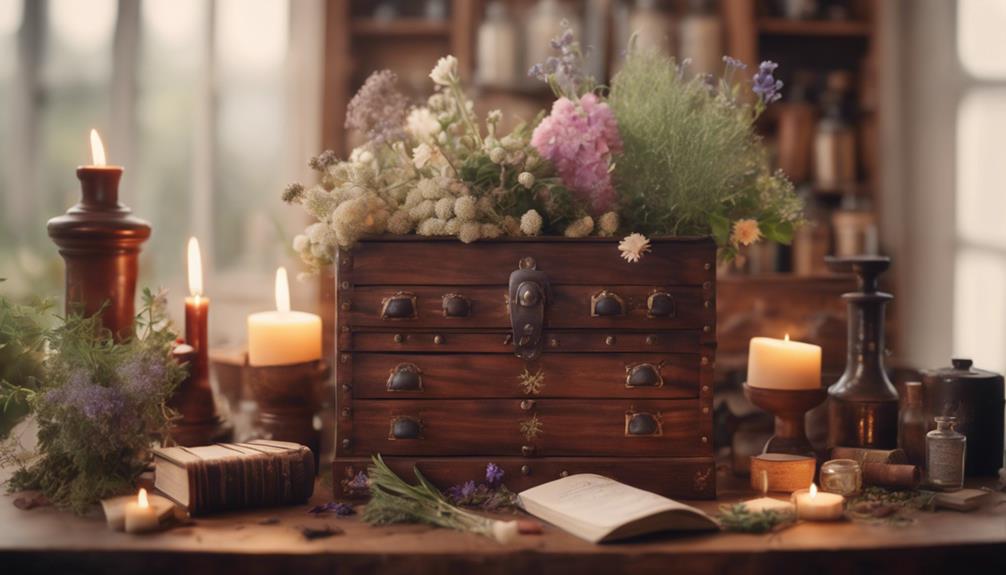
We're taking the first step towards mastering the art of herbalism by recognizing that proficiency with an herbalism kit requires a deliberate and structured approach. We'll familiarize ourselves with the basics, study plant identification guides, and practice identifying herbs. Next, we'll experiment with remedies and potions, seeking guidance from experienced herbalists. Regular practice, expanding our knowledge of herbs, and joining online forums and communities will further enhance our skills. Finally, we'll stay patient and persistent, acknowledging that mastery takes time and effort. As we progress, we'll discover more secrets to revealing the full potential of our herbalism kit.
Key Takeaways
• Study and identify plants to build a solid foundation in herbalism and aid in recognizing unique characteristics of herbs and plants.
• Develop skills in identifying herbs through hands-on practice, verification with field guides or experts, and experimentation with remedies and potions.
• Seek guidance and networking opportunities with experienced herbalists, attend workshops, and join herbalism guilds or organizations to enhance skills.
• Keep a detailed journal to track progress, reflect on insights, and refine skills to become proficient with the herbalism kit.
• Dedicate time for daily practice, master basic techniques, and experiment with herbs to refine skills and achieve mastery.
Familiarize Yourself With Basics
As we explore the world of herbalism, let's begin by understanding the fundamental benefits of proficiency with an herbalism kit. Having proficiency with this kit is more than just a nice-to-have; it's a game-changer in various situations.
We've learned that proficiency with the kit grants us a bonus on herb-related ability checks, giving us an edge in critical moments. Additionally, we've discovered that proficiency is required for stabilizing dying characters with a Medicine check, making it an essential skill for any healer. Furthermore, we've found that proficiency is essential for creating antitoxins and potions of healing, which can be lifesavers in combat.
The Healer feat can even enhance our usage of the kit, making us more effective in our roles.
As we explore further, we're realizing that proficiency with an herbalism kit adds versatility and utility to our characters in various situations. By mastering this kit, we're opening ourselves up to new possibilities and opportunities in the world of herbalism.
Study Plant Identification Guides
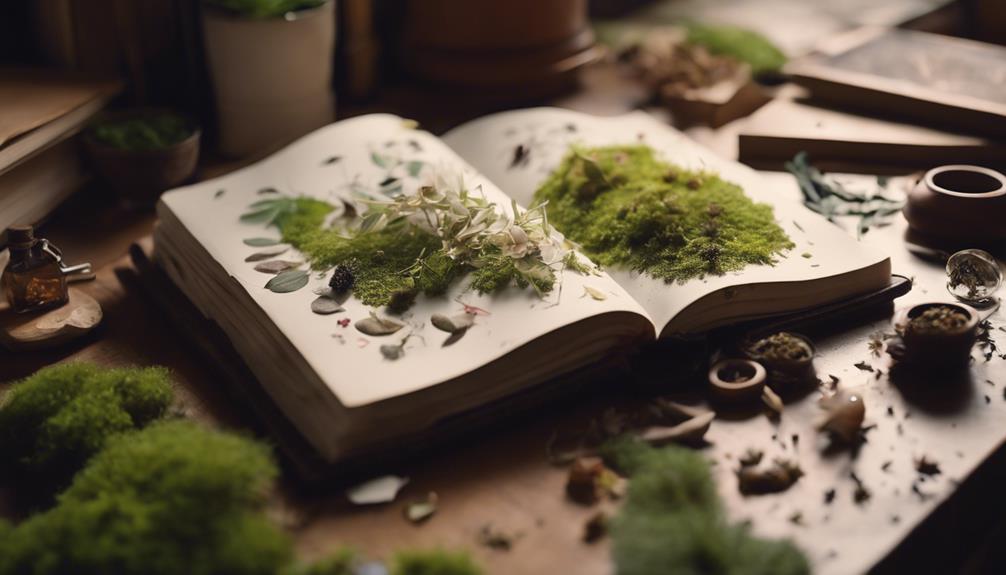
We take our first step towards mastering the herbalism kit by opening plant identification guides, which hold the secrets to recognizing the characteristics of herbs and plants that will soon become our allies in the world of herbalism. These guides provide us with a wealth of information about the visual cues, smells, and textures of various plants, allowing us to identify them with confidence.
As we explore deeper into the guides, we'll learn about the properties of different plants, including which ones are toxic, medicinal, or edible. This knowledge is essential when collecting plants for our herbalism kit, which includes pouches and gloves for safe and efficient harvesting.
By studying plant identification guides, we'll gain a solid foundation in herbalism and be able to distinguish between similar-looking plants. This foundation will serve us well as we continue our journey, allowing us to create effective remedies and potions with confidence.
With each guide, we'll become more adept at recognizing the unique characteristics of herbs and plants, paving the way for a deeper understanding of herbalism.
Practice Identifying Herbs
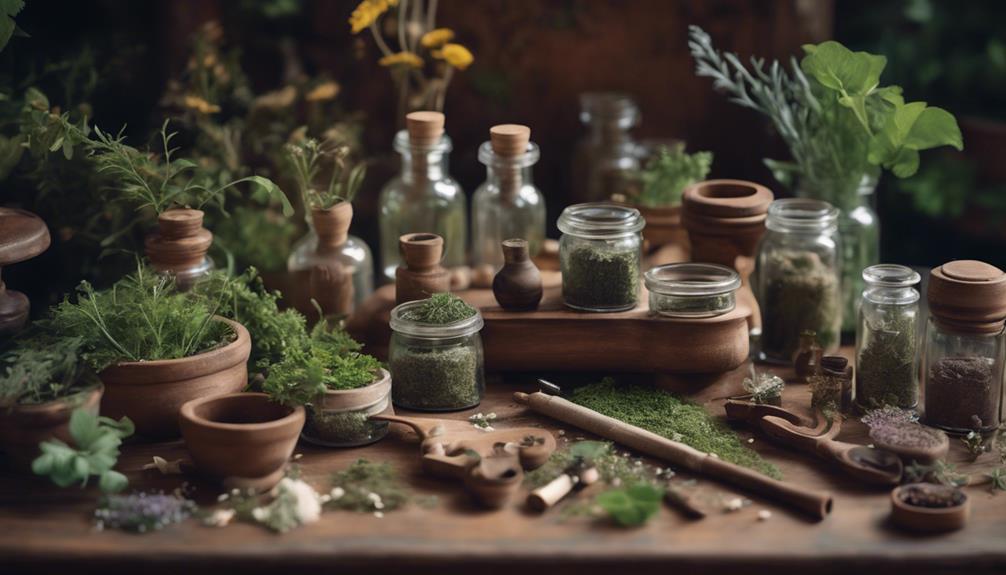
Now that we've studied plant identification guides, it's time to put our knowledge into practice, starting with familiarizing ourselves with common herbs found in our region.
As we explore the world of herbalism with our herbalism kit, we need to develop the essential skill of identifying herbs. To do this, we'll begin by studying the distinct features and characteristics of each herb, which will help us distinguish between similar-looking herbs.
We'll take field trips to observe herbs in their natural habitats, learning more about their growth patterns, habitats, and unique features. To test our skills, we'll gather herbs and verify our identification with a field guide or expert.
This hands-on practice will help us become proficient in identifying herbs, an important step in mastering our herbalism kit. By honing our identification skills, we'll be able to confidently identify and use herbs in our herbalism kit, taking us one step closer to becoming skilled herbalists.
Experiment With Remedies and Potions
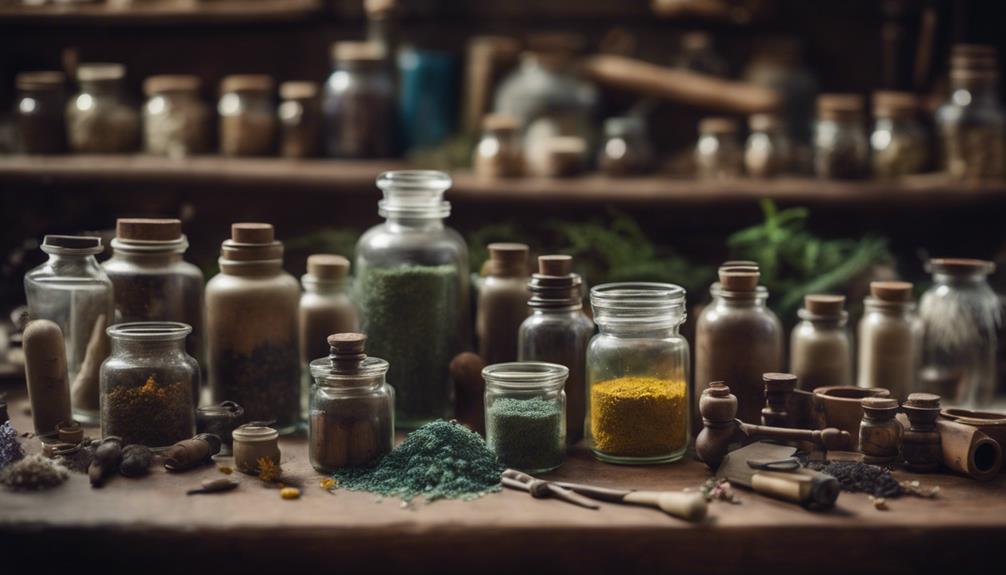
As we continue to hone our herbalism skills, we'll now focus on experimenting with remedies and potions.
We'll try out different potion combinations, test various herbal blends, and rank the effectiveness of each remedy to refine our craft.
Potion Combinations Tried
By exploring diverse herbal combinations, we uncover innovative ways to amplify the effects of our potions and remedies.
As we immerse ourselves in the world of herbalism, we're excited to investigate the vast possibilities of potion combinations using our herbalism kit. We're not just limited to traditional recipes; instead, we can create unique blends that cater to specific needs.
By mixing healing herbs with other ingredients, we can enhance the effects of our potions. For instance, combining chamomile with lavender can create a calming potion, while pairing ginger with turmeric can create an anti-inflammatory remedy.
We're testing out different recipes and ratios to discover the most potent and effective potion combinations. By tracking our experiments and their results, we're building a repertoire of successful potion combinations. This process allows us to refine our skills, making us more confident in our ability to craft remedies that truly work.
As we continue to experiment, we're tapping into the full potential of our herbalism kit and exploring new possibilities for our health and wellness.
Herbal Blends Tested
We're exploring the boundaries of our herbalism kit by designing and testing novel herbal blends to tackle specific ailments and enhance our overall well-being.
By conducting experiments with various herbs and ingredients, we're uncovering new combinations that can provide unique benefits.
We're investigating the potency and efficacy of different herbal remedies by combining them in our kit, carefully recording our findings to track the success rates and side effects of each blend.
This meticulous approach allows us to refine our herbalism skills, creating effective remedies that can be used in practical applications, such as healing wounds or providing temporary boosts to abilities.
We're not just stopping at personal use; we're also sharing our tested herbal remedies with our party members, providing them with valuable tools to aid them in their adventures.
As we explore further into the world of herbalism, we're discovering the vast potential of herbs and their ability to improve our lives.
Remedy Effectiveness Ranked
We've been experimenting with a wide range of remedies and potions to gauge their effectiveness in various situations, from healing wounds to boosting combat performance.
To get a better understanding of what works best, we've ranked the potency and efficacy of each remedy based on its impact in different scenarios. For instance, we found that certain potions excelled in combat situations, while others were more effective in healing wounds.
We also tested the duration and side effects of each potion to determine their overall utility in different encounters.
In terms of cost-effectiveness, we evaluated the resources required to craft each potion and remedy, optimizing our resource usage. By comparing the benefits and drawbacks of using specific remedies against different types of ailments or conditions, we gained valuable insights into what works best in each situation.
Our ranking of remedy effectiveness takes into account the varying levels of potency and efficacy, helping us make informed decisions when crafting and using our herbalism kit.
Seek Guidance From Experienced Herbalists
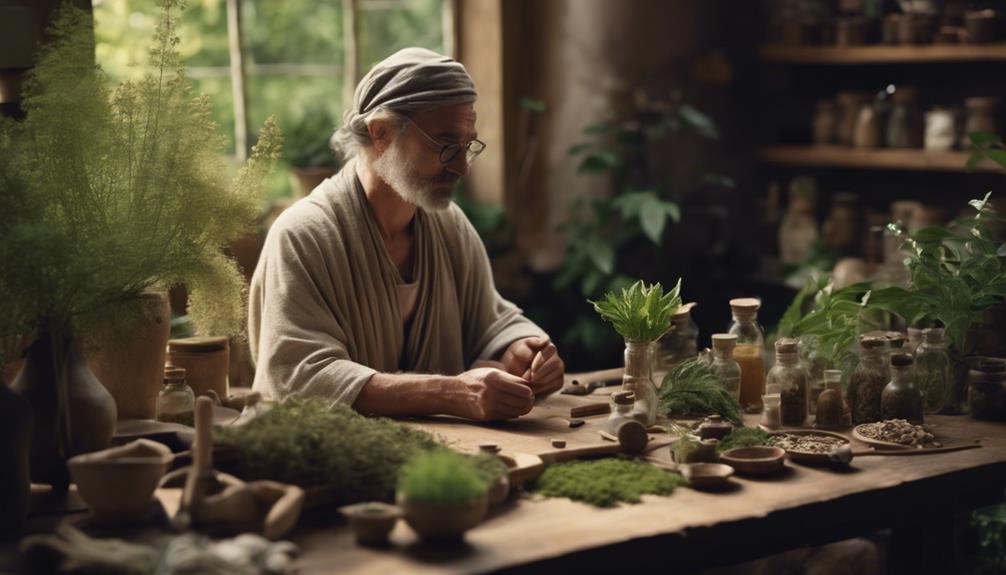
One essential step in mastering an herbalism kit is finding a knowledgeable guide who can share their expertise and provide personalized feedback.
We can't stress enough the importance of seeking guidance from experienced herbalists when it comes to achieving proficiency with an herbalism kit. By doing so, we can gain valuable insights into the intricacies of identifying plants, creating remedies, and using the kit effectively.
We can attend workshops or classes on herbalism, where we can learn from seasoned practitioners and get hands-on experience with the kit. Alternatively, we can study under a master herbalist, who can provide one-on-one guidance and mentorship.
Joining herbalism guilds or organizations is another great way to connect with other practitioners and enhance our proficiency with the kit. By surrounding ourselves with experienced herbalists, we can refine our skills and gain confidence in using our clippers and leather gloves to harvest and prepare herbs for remedies.
With their guidance, we can improve our proficiency with an herbalism kit and maximize its full potential.
Keep a Journal of Progress
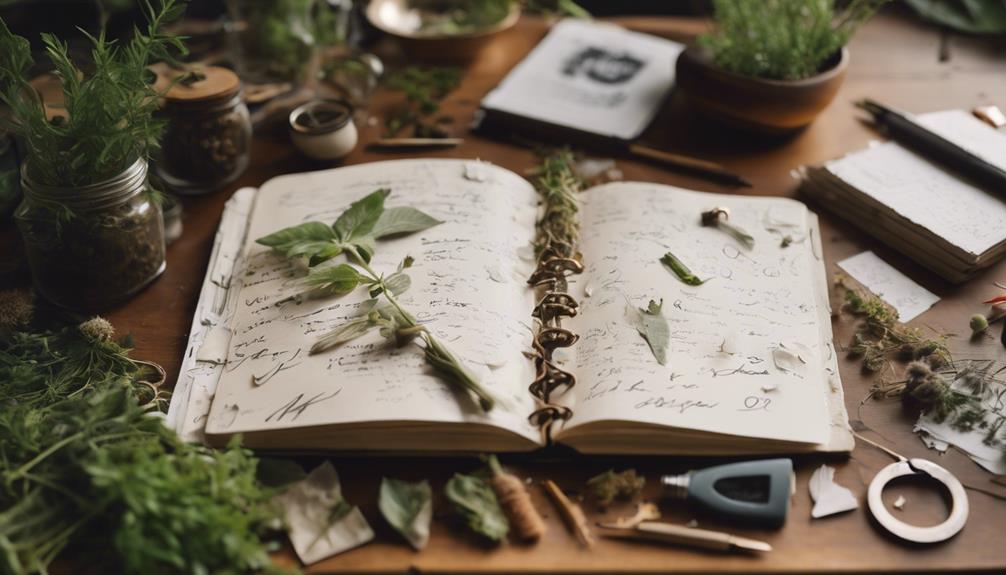
As we continue on our journey to proficiency with our herbalism kit, we're reminded of the importance of keeping a journal of progress. By tracking our progress and recording insights, we'll be able to reflect on our experiences and identify areas where we need more practice.
Tracking Progress
By maintaining a detailed journal of our herbalism journey, we're able to accurately track our progress and identify areas for improvement. Through our dedicated journal, we can record each herb gathered, recipes learned, and successful checks, allowing us to see how far we've come.
We note the locations where rare herbs are found, the potency of crafted items, and any failed attempts, helping us refine our techniques. Additionally, we keep track of the value of herbs collected, crafting costs, and the effectiveness of potions created.
By documenting any special methods or techniques used during herb gathering, crafting, and analyzing items, we can refine our skills over time. Regularly reviewing our journal helps us track progress, identify patterns, and improve our herbalism skills.
Recording Insights
We log every herbalism milestone in our journal, from the rare finds to the failed concoctions, to reflect on our progress and pinpoint areas for improvement. Recording our insights helps us track our growth and identify patterns in our herbalism journey.
We record the herbs collected, noting their potency and the recipes we've learned to create potent potions. We also document the DCs of checks made, the effects of herbs used, and any unique discoveries made during our herbalism activities.
Additionally, we keep track of our interactions with NPCs related to herbalism, the locations where rare herbs were found, and any special quests completed. By maintaining a log of our progress, we can see the benefits we've gained from using the kit and identify areas where we need to improve our herbal knowledge.
This journal serves as a valuable resource, helping us refine our skills and become proficient in herbalism.
Dedicate Time to Regular Practice

To establish a strong foundation in herbalism, we commit to setting aside a consistent time each day to practice using our herbalism kit. This dedication allows us to master basic techniques, experiment with different herbs, and refine our skills.
| Day | Practice |
|---|---|
| Monday | Identify 3 new plants in our herbalism kit |
| Tuesday | Create a simple remedy using chamomile |
| Wednesday | Experiment with different herbal tea blends |
| Thursday | Practice making herbal salves |
| Friday | Review and document our progress |
Expand Your Knowledge of Herbs
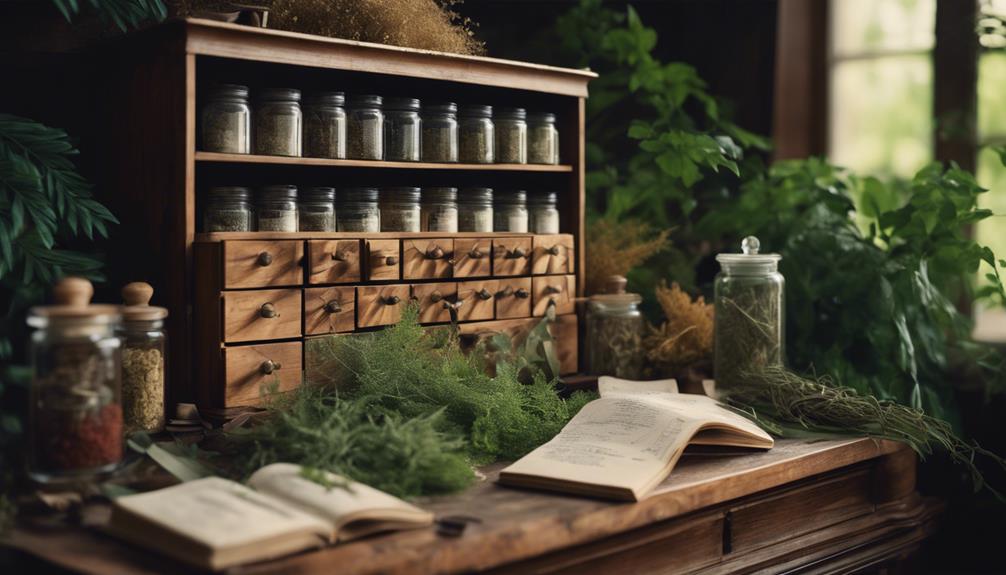
As we explore further into the world of herbalism, we're excited to investigate the vast array of herbs and their unique properties. To expand our knowledge of herbs, we'll delve into the different types, such as healing, poisonous, or magical herbs, and understand how they're used in potions and remedies.
We'll study the lore and history of herbalism to gain a deeper understanding of herbology. Experimenting with creating mixtures and concoctions using various herbs will help us see their effects firsthand. Consulting with experienced herbalists or alchemists will also broaden our understanding of herbs and their applications.
Our herbalism kit will be a valuable resource as we explore the properties of herbs and how they interact with each other. By expanding our knowledge of herbs, we'll be able to develop more effective remedies and potions, and unleash the full potential of our herbalism kit.
With dedication and practice, we'll become proficient in using our herbalism kit to create powerful and beneficial concoctions.
Join Online Forums and Communities

By tapping into the collective knowledge of online forums and communities, we can accelerate our journey towards proficiency with an herbalism kit. These platforms provide unparalleled access to experienced herbalists, enthusiasts, and experts who can offer valuable insights and guidance.
By engaging with online forums and communities, we can:
- Participate in discussions on herbalism kit proficiency and learn from others
- Seek advice from experienced players on acquiring proficiency with an herbalism kit
- Share our progress and ask questions to enhance our understanding of herbalism kit proficiency
- Utilize resources provided by online communities to guide us through the process of gaining proficiency
- Engage with the community to gain insights on how to acquire proficiency with an herbalism kit
Stay Patient and Persistent

Mastering an herbalism kit takes time and effort, and it's important to stay patient and persistent throughout the journey.
We've all been there – feeling frustrated when our remedies don't turn out as expected or when we struggle to identify a particular herb. However, it's vital to remember that proficiency with an herbalism kit doesn't happen overnight.
We need to be patient and persistent in our practice, continually seeking out new knowledge and skills. By doing so, we'll start to notice a proficiency bonus – our remedies will become more effective, and our confidence will grow.
We'll be able to experiment with new herbs and techniques, expanding our expertise and deepening our understanding of herbalism. So, let's make a commitment to ourselves to stay the course, even when the going gets tough.
With persistence and patience, we'll tap into the full potential of our herbalism kit and become skilled herbalists.
Frequently Asked Questions
What Is the Proficiency With the Herbalism Kit?
Having an herbalism kit proficiency is a valuable asset in D&D, granting a bonus on herb-related ability checks and stabilizing dying characters.
This tool is essential for creating antitoxin and potions of healing.
How to Gain Proficiency in 5e?
We've all wondered how to gain proficiency in 5e.
Did you know that only 30% of players choose classes that grant proficiency with herbalism kits at character creation?
Surprisingly, this oversight can be overcome. To gain proficiency, we can:
- Choose a class that grants it
- Take it as a starting proficiency
- Multiclass
- Find an in-game mentor
- Use downtime activities to study and practice.
How Does Herbalism Kit Work 5e?
It's clear that the herbalism kit in 5e can be a bit confusing. So, let's break it down: the kit itself doesn't grant any bonuses, but proficiency with it does.
One can use it to craft antitoxin and potions of healing, and it's required for stabilizing dying characters with a Wisdom (Medicine) check. Plus, individuals can enhance their kit usage with feats like Healer for added benefits.
What Skill Is Herbalism?
As we explore the world of Dungeons & Dragons, an important question arises: what skill is herbalism?
The answer lies in the domain of Wisdom, specifically the Medicine skill. Herbalism is closely connected to Wisdom (Medicine), allowing proficient characters to add their bonus to herb-related ability checks.
This synergy is essential for stabilizing dying characters and crafting potions.
Conclusion
As we grasp our herbalism kits, the journey to proficiency unfolds like a blooming garden. With each step, our knowledge deepens, and our skills flourish.
Like a seasoned herbalist, we'll wield the power to heal and nourish. The path may twist and turn, but with persistence and dedication, the rewards are boundless.
As we tend to our craft, the world of herbalism will unfold its secrets, and we'll become the masters of our own botanical destiny.
Herbalism
How to Use Lush Herbalism Face Cleanser
Transform your skincare routine with the ultimate guide on how to unlock the full potential of Lush Herbalism Face Cleanser.

We use Lush Herbalism Face Cleanser as part of our daily skincare routine to maximize the benefits and achieve balanced, healthy-looking skin. To get started, we mix a small amount of the cleanser with water to create a gentle, exfoliating paste. We then massage it onto our damp skin, focusing on circular motions to effectively cleanse and unclog pores. After rinsing thoroughly with warm water, we pat our skin dry and apply a moisturizer to seal in the benefits. By following these simple steps, we can fully unleash the potential of this nourishing face cleanser and enjoy clearer, more balanced skin. There's more to discover about this amazing product, and its benefits for our skin.
Key Takeaways
• Start with a small amount and mix with water to achieve desired consistency for individual skin needs.
• Massage gently onto damp skin for daily cleansing, then rinse off thoroughly with warm water.
• Leave the cleanser on for 30 minutes as a mask every 3 days to maximize benefits.
• Pat dry skin gently after rinsing and apply moisturizer to seal in benefits.
• Mix with water for gentle exfoliation and use circular motions for effective cleansing.
Preparing the Cleanser
We take a small amount of Lush Herbalism Face Cleanser in our hand to begin the preparation process. This gentle, effective cleanser is infused with kaolin clay, which helps to absorb impurities and purify the skin.
As we hold the product, we can appreciate the care that LUSH puts into crafting their Herbalism line, using only the finest ingredients to promote healthy, balanced skin.
Before we can experience the benefits of this fantastic cleanser, we need to prepare it for use. We start by taking a small amount, about the size of a pea or a grain of rice, depending on our individual skin needs. This guarantees we're using just the right amount to effectively cleanse our skin without wasting any product.
Now that we've our cleanser, we're ready to move on to the next step: mixing it with water to create a smooth, spreadable paste.
Mixing With Water

Adding a few drops of water to the small amount of Herbalism face cleanser in our hand, we create a paste-like consistency that's perfect for gentle cleansing. By mixing the two together, we achieve a smooth texture that's suitable for massaging onto our skin. But how do we get it just right?
Here are some key points to keep in mind when mixing with water:
- Start with a small amount of cleanser and add water gradually, as it's easier to add more water than it's to remove excess.
- Mix the cleanser and water together until well combined, ensuring a smooth and even consistency.
- Adjust the amount of water to achieve your desired consistency for effective cleansing – you may prefer a thicker or thinner paste depending on your skin type.
- Remember, the goal is to create a paste-like consistency that's gentle on your skin, so don't be afraid to experiment and find what works best for you.
Applying to the Skin

Now that we've mixed our Herbalism face cleanser with water, it's time to apply it to our skin.
We'll gently massage the paste onto our damp skin, focusing on areas that need a good cleanse or exfoliation.
Washing Your Face
To get the most out of Lush Herbalism Face Cleanser, take a small amount and mix it with water to create a gentle, non-abrasive paste that's perfect for daily use.
We're excited to share with you how to wash your face effectively with this amazing cleanser.
Here's how we do it:
- Gently massage the paste onto damp skin, focusing on areas with excess oil or blemishes.
- Rinse thoroughly with warm water to remove the cleanser and any impurities from the skin.
- Use the cleanser daily for best results in maintaining clear and balanced skin.
- For a deeper cleanse, leave the paste on the skin for 30 minutes as a mask every three days.
The kaolin clay in Lush Herbalism Face Cleanser helps to absorb excess oil, while rosemary works to balance and calm our skin.
Moisturizing After Rinsing
With our skin freshly cleansed and patted dry, we're ready to seal in the benefits of the Herbalism Face Cleanser with a lightweight, non-comedogenic moisturizer. This essential step helps lock in hydration and maintain skin balance, ensuring our skin looks and feels its best.
We should avoid using heavy or pore-clogging creams, as they can counteract the benefits of the cleanser and cause more harm than good. Instead, we opt for a moisturizer that complements the gentle, balancing properties of the Herbalism Face Cleanser.
By applying a lightweight moisturizer after rinsing, we allow our skin to absorb the nourishing ingredients and reap the rewards of a healthy, balanced complexion. Consistency is key, so we make moisturizing a regular part of our skincare routine to maintain ideal hydration and skin balance.
Massage and Exfoliation

We massage Herbalism Face Cleanser onto damp skin to effectively remove dirt and impurities, and simultaneously exfoliate with its gentle ground almonds. This dual-action process leaves our skin feeling refreshed and revitalized.
As we massage the cleanser onto our skin, the ground almonds gently remove dead skin cells, promoting a healthy glow and improving skin texture.
Some benefits of using Herbalism Face Cleanser include:
- The combination of clay, chamomile, and oil helps to soothe and calm the skin
- The gentle exfoliation from the ground almonds and rice helps to remove dead skin cells and promote cell turnover
- Regular use can leave the skin looking brighter and more radiant
- The natural ingredients work in harmony to nourish and moisturize the skin
Rinsing and Drying

After massaging the Herbalism Face Cleanser onto our skin, we rinse it off thoroughly with warm water to remove all remaining impurities. This step is vital in ensuring our skin is completely clean and free of any residue.
We make sure to rinse our face thoroughly, ensuring all the cleanser is removed. Once we've rinsed, we gently pat our skin dry with a clean towel. It's important to avoid rubbing our skin vigorously with the towel, as this can cause irritation and dryness. Instead, we pat our skin gently to remove excess water.
After drying, we can either let our skin air dry or follow up with a moisturizer if needed. By doing so, we're allowing our skin to breathe and absorb any subsequent products more effectively. By following these simple steps, we can guarantee our skin is clean, refreshed, and ready for the next steps in our skincare routine.
Using as a Mask

Taking our skincare routine to the next level, we can also use Lush's Herbalism Face Cleanser as a mask to deeply nourish and purify our skin. This mask treatment allows the kaolin clay and rice bran to work their magic, drawing out impurities and soothing our skin.
Here's how we can reap the benefits of Herbalism as a mask:
- Apply a thick layer to clean, dry skin and relax for 10-15 minutes
- Rinse off with warm water, gently massaging as you go
- Use 2-3 times a week for best results
- Enjoy the calming and cleansing benefits of Herbalism for a spa-like experience
Tips for Best Results

To get the most out of Lush's Herbalism Face Cleanser, mix it with water to form a gentle exfoliating paste that unclogs pores and reveals refreshed skin.
We've found that using a small amount of the cleanser and mixing it with water creates the perfect consistency for gentle exfoliation. When we massage the paste onto our damp skin in circular motions, we're able to cleanse and purify our skin effectively.
After rinsing our skin thoroughly with warm water, we're left with refreshed and revitalized skin. For added benefits, we like to leave the paste on our skin for 30 minutes as a calming and clarifying mask.
The combination of clay and rice bran helps to draw out impurities, while the kaolin and nettle and chamomile work to soothe and calm our skin. We also appreciate that the Chlorophyllin Water in the cleanser helps to balance our skin's pH levels.
Benefits of Herbalism

We've found that one of the most significant benefits of Herbalism Face Cleanser is its ability to balance and control excess oil, minimizing pores and promoting a healthy skin balance. This is made possible by its deep-cleansing base of kaolin, which absorbs excess oil without stripping our skin of its natural moisture.
Additionally, the Chamomile blue oil in Herbalism helps to soothe and calm our skin, reducing redness and inflammation.
Some of the key benefits of using Herbalism Face and Body include:
- Balanced skin: Herbalism helps to regulate our skin's oil production, resulting in a more balanced and healthy complexion.
- Reduced acne: By controlling excess oil and reducing pores, Herbalism helps to minimize acne breakouts and promote clearer skin.
- Soothing and calming: The Chamomile blue oil in Herbalism helps to calm and soothe our skin, reducing redness and inflammation.
- Gentle exfoliation: The ground almonds in Herbalism provide gentle exfoliation, removing dead skin cells and revealing smoother, brighter skin.
Skin Type Considerations

Most of us with oily or combination skin types can breathe a sigh of relief, as Herbalism Face Cleanser is specifically designed to tackle our skin concerns. The natural ingredients in Herbalism, including alfalfa plants, help to balance and control excess oil on the skin, making it an ideal cleanser for our skin types.
Here's a breakdown of how Herbalism Face Cleanser benefits different skin types:
| Skin Type | Benefits of Herbalism |
|---|---|
| Oily | Controls excess oil, reduces shine |
| Combination | Balances skin, clears pores |
| Sensitive | Gentle, non-irritating formula |
| Problematic | Soothes acne, redness, and irritation |
| All Skin Types | Improves skin texture, clarifies pores |
Herbalism Face Cleanser is gentle enough for sensitive skin, yet effective in clearing pores and improving skin texture. By using Herbalism daily as a cleanser and as a mask every three days, we can experience the best results for our skin.
Storage and Shelf Life

We store our Lush Herbalism Face Cleanser in a cool, dry place away from direct sunlight to safeguard its natural ingredients and guarantee its effectiveness. This is important because the product's natural ingredients can be affected by environmental factors, which may impact its shelf life.
Here are some key storage tips to keep in mind:
- Avoid storing the cleanser in humid or wet environments to prevent spoilage.
- Keep it away from direct sunlight, which can cause the natural ingredients to degrade.
- Store it in a cool place, as high temperatures can affect the product's consistency and effectiveness.
- Use the product within a reasonable time frame to maintain its effectiveness, as the shelf life may vary due to its natural ingredients.
Frequently Asked Questions
How Do You Use Lush Herbalism Cleanser?
When it comes to using Lush Herbalism cleanser, we start by taking a small amount in our hand.
Next, we add water to create a paste-like consistency.
Then, we gently massage the paste onto damp skin in circular motions.
After that, we rinse thoroughly with warm water to remove the cleanser.
For best results, we use it daily or as a mask every three days, leaving it on for 30 minutes before rinsing off.
How Do You Use Lush Face Cleanser?
As we gaze into the mirror, our skin crying out for a deep cleanse, we turn to Lush's Herbalism face cleanser for rescue.
So, how do we use this miracle worker? We take a small amount, mix it with water to create a paste, and gently massage it onto damp skin, focusing on areas of concern.
Then, we rinse thoroughly with warm water and follow up with a moisturizer to keep our skin hydrated and balanced.
How Do You Apply Face Cleansing?
When applying face cleansing products, we typically start by wetting our faces with warm water.
Next, we dispense a suitable amount of cleanser into our hands, working it into a gentle lather.
We then massage the cleanser onto our skin in circular motions, making sure to cover all areas.
After a thorough cleanse, we rinse our faces thoroughly with warm water, patting dry to complete the process.
What Are the Benefits of Herbalism Lush?
We've found that using Herbalism Lush offers several benefits for our skin. It gently exfoliates, soothes, and calms irritated skin, reducing redness and promoting a healthy balance.
Regular use has led to clearer skin, reduced acne breakouts, and overall skin improvements.
The natural ingredients, like ground almonds and powdered herbs, help control excess oil and minimize pores, leaving our skin feeling fresh and bright.
Conclusion
As we begin our skincare journey with Lush's Herbalism face cleanser, we've revealed the secrets to unleashing its full potential. From preparation to application, we've mastered the art of incorporating this natural wonder into our daily routine.
But the real question remains: what lies ahead? Will our skin transform, radiant and renewed? Only time will tell, but one thing is certain – with Herbalism, the possibilities are endless, and the journey is just beginning.
Herbalism
How to Use Herbalism Skill Effectively: 10 Proven Techniques
Gain mastery over medicinal plants and unlock the secrets to optimal wellness with 10 proven techniques to elevate your herbalism skills.

By mastering key herbalism skills, we can unleash the full potential of plant-based remedies. We develop a personal herbal database to track medicinal properties and uses, while prioritizing ethical wildcrafting practices to guarantee sustainability. We also cultivate medicinal herbs organically, incorporate them into daily meals, and preserve them for future use. Additionally, we prepare herbal remedies confidently, stay updated on the latest research, and share our knowledge with others. By honing these skills, we can promote wellness, prevent disease, and foster a deeper connection with nature. As we continue to refine our herbalism skills, we'll discover even more ways to harness the power of plants for optimal health.
Key Takeaways
• Develop an organized herbal database to record medicinal properties, uses, and contraindications of herbs for easy reference.
• Practice ethical wildcrafting by harvesting abundant plants, asking permission, and respecting ecosystems to ensure sustainability.
• Integrate herbs into daily meals to enhance flavors, nutrients, and creativity, and experiment with different herbs for diverse flavors and aromas.
• Preserve herbs through drying, freezing, or infusions to enjoy their benefits year-round and maintain potency.
• Stay updated on herbal research by following reputable sources, attending workshops, and engaging with herbal experts to refine skills and knowledge.
Develop a Personal Herbal Database
As we begin our herbalism journey, creating a personal herbal database becomes an essential step in organizing and refining our knowledge of medicinal plants. We recognize the importance of accurately recording medicinal properties, uses, and contraindications of various herbs to guarantee effective and safe use.
By creating a detailed herbal database, we can efficiently retrieve information on herbal tea recipes, preparation methods, and specific dosage recommendations. We also include plant identification details, such as botanical names, family, habitat, and growing conditions, to accurately recognize and differentiate between plants.
Additionally, we record our personal experiences with herbs, noting dosage effectiveness, side effects, and individual reactions, to tailor our herbal knowledge to our specific needs. By regularly updating and reviewing our herbal database, we can incorporate new findings, adjust dosage recommendations, and refine our understanding of herbal remedies.
This personalized approach enables us to develop a deep understanding of medicinal plants, empowering us to make informed decisions about our herbal practices.
Master Ethical Wildcrafting Practices

As we explore the world of herbalism, we're committed to mastering ethical wildcrafting practices that prioritize the well-being of both people and the planet.
To achieve this, we'll focus on adopting respectful harvesting methods that guarantee the long-term sustainability of our herbal resources.
Respectful Harvesting Methods
We guarantee the sustainability of our wildcrafting practices by only harvesting plants that we can positively identify and that are abundant in the area. This ensures that we don't over-harvest, damage habitats, or take endangered species. We also follow ethical guidelines such as asking permission, leaving no trace, and giving thanks to the plant before harvesting. This respectful approach not only preserves the environment but also optimizes the potency of the plants.
When we harvest, we consider the season, time of day, and lunar phases to get the best quality for our herbal remedies. We educate ourselves on the specific needs of each plant, including proper harvesting techniques and the best tools to use. By doing so, we can create a medicinal that's rich in essential oils, simply take a few leaves, and craft remedies that truly work.
Identify Sustainable Sources
By mastering ethical wildcrafting practices, we guarantee that our herbal remedies aren't only effective but also sustainable, and it starts with identifying sustainable sources.
We comprehend that sustainable wildcrafting involves harvesting plants in a way that safeguards their continued growth and regeneration in their natural habitat. To achieve this, we must obtain permission to harvest, respect ecosystems, and only take what's needed. We also need to grasp plant populations, growth patterns, and conservation status to make sure we're not harming the environment.
We take note of the right time of year to harvest, avoiding over-harvesting and leaving no trace. By doing so, we support local ecosystems, promote biodiversity, and contribute to the conservation of plant species.
We acknowledge that our actions have a direct impact on the environment, and by being mindful of our harvesting practices, we can guarantee the long-term sustainability of the plants we rely on for our herbal remedies. By identifying sustainable sources, we take the first step towards responsible and ethical herbalism.
Grow Medicinal Herbs Organically

As we explore the world of growing medicinal herbs organically, we'll start by focusing on the foundations of soil preparation, which sets the stage for healthy plant growth.
Next, we'll examine the essential criteria for selecting the right herbs for our climate and needs, ensuring we're working with the most potent and effective varieties.
Soil Preparation Essentials
Growing medicinal herbs organically begins with preparing the soil, a pivotal step that lays the foundation for healthy plant development and ideal nutrient absorption.
We acknowledge that using natural fertilizers like compost, manure, and bone meal is essential to enhance soil fertility. Avoiding synthetic chemicals and pesticides is vital to maintain the purity of our medicinal herbs.
When preparing the soil, we also consider proper drainage and aeration to prevent waterlogging and promote healthy root development. Testing the soil pH and adjusting it to the best range for our medicinal herbs can greatly impact their growth and nutrient absorption.
Additionally, incorporating beneficial microbes through compost or organic amendments can improve soil health and support the overall well-being of our medicinal herbs.
Herb Selection Criteria
What criteria should we consider when selecting medicinal herbs to cultivate organically, ensuring their peak potency and therapeutic benefits?
When choosing medicinal herbs for cultivation, we must prioritize organic growing methods to avoid exposing ourselves to harmful chemicals in the herbs we use for medicinal purposes.
We should also select herbs based on our local climate, soil conditions, and sunlight exposure to guarantee excellent growth.
It's essential to choose herbs with proven medicinal properties and historical uses, as this will secure their effectiveness.
Additionally, we should consider the sustainability of our herb cultivation practices to secure the long-term availability of these medicinal plants.
By regularly monitoring and maintaining the health of our medicinal herbs, we can maximize their potency and therapeutic benefits.
By considering these factors, we can cultivate high-quality, organic medicinal herbs that provide excellent therapeutic benefits.
Incorporate Herbs Into Daily Meals

We can elevate our meals from ordinary to extraordinary by incorporating herbs into our daily cooking, adding a burst of flavor, nutrients, and creativity to our plates. By doing so, we can enhance the flavors of our dishes, adding depth and complexity to our meals. Herbs are also rich in vitamins, minerals, and antioxidants, providing nutritional benefits when used in cooking. With a wide variety of herbs available, we can experiment with different flavors and aromas, allowing us to get creative in the kitchen.
Here are some popular herbs to incorporate into our daily meals:
| Herb | Flavor Profile | Health Benefits |
|---|---|---|
| Basil | Sweet, pungent | Anti-inflammatory, antioxidant |
| Rosemary | Piney, herbaceous | Improves memory, antioxidant |
| Thyme | Minty, earthy | Antibacterial, anti-inflammatory |
| Oregano | Earthy, pungent | Antibacterial, antioxidant |
| Cilantro | Fresh, citrusy | Rich in antioxidants, anti-inflammatory |
Preserve Herbs for Future Use

Our herb gardens may flourish for only a few months, but with proper preservation techniques, we can enjoy their flavors and medicinal benefits year-round. Preservation allows us to savor the freshness and potency of our herbs throughout the year, even when our gardens are dormant.
To make the most of our harvest, we've got a few preservation methods up our sleeves. Here are some of our favorites:
- Drying: Dry herbs in a well-ventilated area away from direct sunlight to retain their medicinal properties.
- Freezing: Freeze fresh herbs in ice cube trays with water or oil for convenient use in cooking and herbal preparations.
- Infusions: Create herb-infused oils or vinegars by steeping herbs in a carrier liquid to enhance flavor and medicinal benefits.
- Blending: Make herb blends or teas by combining dried herbs in varying ratios to create customized blends for specific health needs.
Create Natural Body Care Products

As we delve into the domain of natural body care products, we'll uncover the art of blending essential oils to create unique scents and therapeutic benefits.
We'll also learn how to source high-quality, natural ingredients and customize our products to cater to individual skin needs and preferences.
Essential Oil Blending
When creating natural body care products, blending essential oils allows us to harness the unique properties and scents of individual oils to achieve specific therapeutic benefits for the skin and overall well-being. By combining different essential oils, we can create customized blends that address specific skin concerns or promote relaxation and stress relief.
To create effective blends, it's important to understand the properties of each oil and how they interact with one another. Here are some key considerations:
- Top, middle, and base notes: Understanding the aroma profiles of each oil is critical for creating well-balanced blends.
- Dilution ratios: Diluting essential oils properly with carrier oils ensures safe application on the skin and prevents skin irritation or sensitization.
- Experimentation: Trying different essential oil combinations and ratios allows for customization based on personal preferences and desired effects.
- Carrier oils: Selecting the right carrier oil is crucial for delivering the therapeutic benefits of essential oils to the skin.
Natural Ingredient Sourcing
We source high-quality, organic herbs and botanicals to craft body care products that not only feel amazing on the skin but also align with our values of sustainability and environmental responsibility.
When creating natural body care products, we prioritize sourcing organic, sustainably harvested herbs to guarantee quality and purity. We like to utilize local resources, visiting farmers markets to discover fresh herbs and botanicals for our homemade creations.
Additionally, we research reputable suppliers and online stores that offer a wide selection of organic herbs and natural ingredients for body care products. For a more hands-on approach, we consider growing our own medicinal herbs in a garden or indoor pots to have a fresh and readily available supply.
We also prioritize ethically sourced and fair trade ingredients to support environmentally conscious practices in our herbal body care products. By taking these steps, we can create effective and sustainable body care products that benefit both our skin and the planet.
Product Customization Options
By harnessing the power of herbalism, we can craft personalized body care products that cater to our unique skin types, needs, and preferences. This level of customization allows us to create products that are tailored to our individual skin concerns, whether it's acne, dryness, or sensitivity.
To take our product customization to the next level, we can:
- Select herbs based on their therapeutic properties, such as lavender for relaxation or peppermint for invigoration.
- Experiment with different herbal infusions in body care products like lotions, balms, and scrubs to create unique scents and benefits.
- Incorporate herbal extracts, oils, and essences into homemade body care items for added nourishment and skin-loving properties.
- Adjust herb concentrations to suit individual preferences and skin needs.
Prepare Herbal Remedies Confidently

With a solid understanding of herbal medicine making, we're now ready to prepare herbal remedies confidently. To do so, we must research the medicinal properties of herbs to understand their benefits and potential uses in herbal remedies.
We should follow trusted recipes and dosage guidelines when preparing herbal remedies to guarantee safety and effectiveness. Investing in quality tools and equipment, such as mortar and pestle, jars, and measuring spoons, is also vital for herbal medicine making.
A well-organized herbal apothecary with labeled herbs and ingredients is essential for easy access when preparing remedies. By practicing making different types of herbal preparations, such as teas, tinctures, salves, and poultices, we can expand our skills and repertoire.
This will enable us to prepare a wide range of remedies confidently and effectively. As we continue to hone our skills, we'll become more proficient in creating herbal remedies that truly make a difference.
Stay Updated on Herbal Research

Numerous breakthroughs in herbal research have led to significant advancements in the field, making it vital to stay informed about the latest findings. We must prioritize staying updated on the latest research to guarantee our herbalism skills remain effective and evidence-based.
To do this, we can:
- Follow reputable herbal journals and websites to stay informed on the latest research findings in herbalism.
- Attend herbal conferences, workshops, and webinars to learn about new studies and advancements in herbal medicine.
- Join online forums and communities dedicated to herbalism to discuss and share the latest research with like-minded individuals.
- Engage with herbal experts and practitioners to gain insights into how research findings can be effectively applied in herbal practices.
Share Herbal Knowledge With Others

As we continue to refine our herbalism skills, we're compelled to share our knowledge with others, spreading awareness about the benefits of herbalism and empowering individuals to take charge of their health.
One effective way to do this is by hosting herbal workshops or classes, where we can educate a group of people interested in learning about natural remedies. We can also create and distribute informative herbal guides or pamphlets, providing others with valuable information on the benefits and uses of different herbs.
Additionally, we can start a community herb garden or participate in community events to promote herbalism and encourage others to explore its benefits. Collaborating with local health practitioners or schools to integrate herbal education into their curriculum or wellness programs is another great way to share our knowledge.
Lastly, we can utilize social media platforms or online forums to share herbal tips, recipes, and remedies with a wider audience and connect with like-minded individuals. By sharing our knowledge, we can inspire others to adopt a more holistic approach to health and wellness.
Teach Herbalism to Beginners

When introducing herbalism to beginners, we should start by covering the fundamentals, ensuring they grasp the basics of plant identification, medicinal properties, and common uses before diving deeper. This foundation is essential for building a strong understanding of herbalism.
To effectively teach herbalism to beginners, we should:
- Encourage hands-on learning through practical activities like plant walks, herb identification exercises, and simple herbal preparations.
- Provide resources and recommended readings to deepen beginners' understanding of herbalism and its traditional and modern applications.
- Create a supportive learning environment where beginners can ask questions, share experiences, and feel empowered to explore herbalism further.
- Offer mentorship and guidance as they develop their herbalism skills, emphasizing safety, ethics, and sustainability in their practice.
Frequently Asked Questions
How to Use Herbalism Skill in Sims 4?
We use the herbalism skill in Sims 4 to cultivate, harvest, and utilize various herbs for different purposes.
As we advance our herbalism skill, we can discover rare plants, access special interactions, and craft powerful potions.
We can create herbal remedies to enhance our Sims' mood, cure illnesses, and even earn money by selling herbal products.
How Do I Become a Successful Herbalist?
We become successful herbalists by developing a strong foundation in botanical properties, growing medicinal herbs, and practicing herbal medicine making.
We cultivate practical skills through wildcrafting, foraging, and creating remedies for home and family.
By focusing on mental and physical wellness, we explore herbs for stress relief, immune support, and pain management.
We also share our knowledge with others, fostering a sense of community and connection.
What Is the Best Way to Learn Herbalism?
'When it rains, it pours' – and when it comes to learning herbalism, we're spoiled for choice! To get started, we can immerse ourselves in formal courses or workshops for structured learning, or absorb reputable books and online resources to broaden our knowledge.
We can also engage in community forums and social media groups for diverse perspectives, and even seek mentorship from experienced herbalists. By combining these approaches, we can gain a solid foundation in herbalism and start practicing our skills.
How Do You Use Herbalism?
We utilize herbalism by creating personalized remedies for common ailments. Incorporating herbal teas and tinctures into our daily routine is another key aspect of our practice. We also experiment with herbal body products for skin care and relaxation.
Additionally, we explore culinary herbs in cooking to enhance flavors and nutrition. By sharing our knowledge with others and considering teaching classes, we can effectively pass on valuable skills and information to promote overall health and wellness.
Conclusion
By mastering these 10 proven techniques, we've revealed the secrets to using herbalism skillfully.
We've bridged the gap between ancient wisdom and modern application, empowering ourselves to harness the full potential of medicinal herbs.
With our personal database in place, we're equipped to navigate the complexities of herbalism with confidence, finesse, and a deep respect for the natural world.
-

 Herbology5 months ago
Herbology5 months agoTop 5 Websites for 'A Journey Through Potions and Herbology' Free PDF
-

 Herbology5 months ago
Herbology5 months agoExplore 'A Journey Through Potions and Herbology' by J.K. Rowling: Free PDF Download
-

 Herbology4 months ago
Herbology4 months agoHerbs Used in Iron Butte Herbology
-

 Herbalism6 months ago
Herbalism6 months agoDoes Herbalism Actually Work?
-
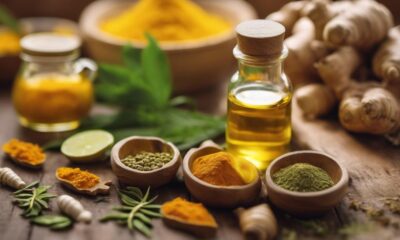
 Inflammation Management6 months ago
Inflammation Management6 months agoBest Natural Medicines for Joint Inflammation Relief
-
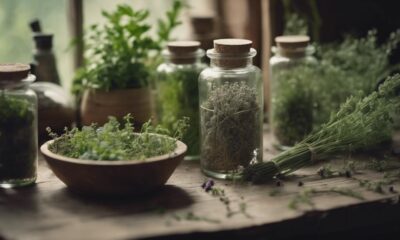
 Herbology4 months ago
Herbology4 months ago7 Must-Visit Herbology Locations for Aspiring Herbalists
-

 Bone Health6 months ago
Bone Health6 months agoHerbal Secrets Unleashed: Boost Bone Density
-
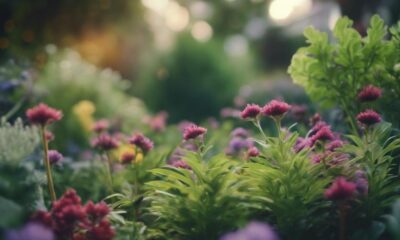
 Anti Aging6 months ago
Anti Aging6 months agoThe Immortal Herb: Unveiling Its Special Qualities










